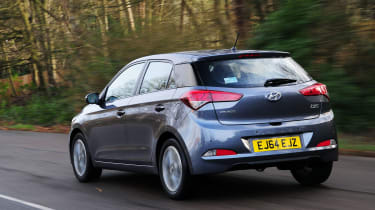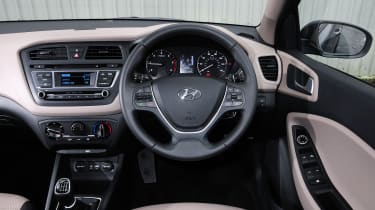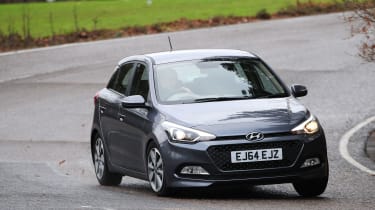Hyundai i20 1.4 petrol review
We test the Hyundai i20 in popular 1.4 petrol guise. Can it live with the top superminis?

The new Hyundai i20 is a good car in a market where just being good isn’t quite enough. Interior room is its strongest suit, as rear seat and boot space are very impressive, while quality and a strong kit count also appeal. But rivals are more comfortable, more engaging to drive and, crucially, more efficient. A new, greener 1.0-litre turbo three-cylinder petrol engine will arrive next year, and it can’t come soon enough.
Hyundai’s model line-up is topped and tailed with brilliance. We love the Santa Fe and the i10, and now it’s time for the rest of the range to catch up. The mission starts with the hugely important new i20 supermini, which has to challenge the brilliant VW Polo and Ford Fiesta, as well as newcomers such as the Vauxhall Corsa and Mazda 2.
The all-new model is a big departure from the outgoing i20 in terms of design, practicality and desirability – all have been improved to help widen its customer base and make the car a genuine class contender.
Visually, the newcomer is very different from its predecessor, giving the i20 a welcome dose of style. In such a conservative sector, it’s bold enough to really stand out, with raked-back LED headlamps, Hyundai’s trademark hexagonal grille and a blacked-out C-pillar the standout features.
What’s not so new is the engine range. All of the i20’s units have been carried over from its predecessor, albeit with minor efficiency tweaks to bring them in line with Euro VI emissions regulations.
Used - available now
We tried the 99bhp 1.4-litre petrol engine, which is capable of returning 51.4mpg – nothing to write home about when compared to rivals. Next to the similarly priced 60.1mpg Polo with its 89bhp 1.2-litre petrol engine, the i20 looks to be rather behind the times, and this is highlighted further by its 127g/km CO2 figure – the VW is far cleaner at just 107g/km.
Performance is pretty mediocre, too. Unlike turbocharged rivals, you really have to extend the engine to get anything out of it, and even then there’s not a great deal on offer. You won’t find more performance elsewhere in the engine range, with a smaller and lesser-powered 1.25-litre petrol and a pair of sluggish diesel units being your only options. Next year, a much needed 1.0-litre three-cylinder turbo will arrive and already it looks likely to be the pick of the range.
The ride is also a bit of a mixed bag. It’s generally OK, but a bit bumpy and occasionally uncomfortable at lower speeds, particularly when travelling around town. It’s better on the motorway, but never feels quite as settled as the Polo, which seems odd considering ‘comfort-enhancing features’ were one of Hyundai’s focal points when developing the new model.
Don’t think that the trade-off is nimble handling, either. The steering is nicely weighted and responsive enough, but it’s nowhere near as much fun as a Fiesta’s or Mazda 2’s. It’s not all bad news, though, especially when it comes to more practical matters. Hyundai has delivered on its promise of providing class-leading interior space, as the new model is longer, lower and wider than its predecessor, and is now the largest supermini on the market.
Whether in the front or rear, there’s masses of headroom, while the 24mm that has been added to the width of the car means three adults can sit pretty comfortably in the back.
A 326-litre boot is 31 litres larger than before and one of the most spacious in its class. The clever packaging also means the rear seats can be folded completely flat, freeing up 1,042 litres. Build quality is strong, but, in spite of a decent kit count, the lack of a smart, integrated touchscreen and navigation system, which supermini buyers have become accustomed to and rivals offer, could put people off. Hyundai will offer a factory-fit option for less than £1,000 on Premium and Premium SE models from next year.
As a class first, Hyundai has also introduced a full-length panoramic roof on the i20. It does impact on headroom, but given the amount of space on offer, it’s barely noticeable.















